英语人教版九年级全册unit13 教案
- 格式:doc
- 大小:93.50 KB
- 文档页数:5
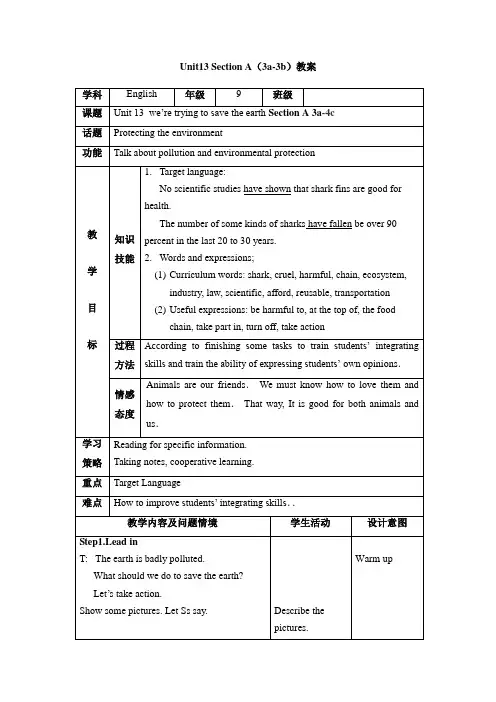
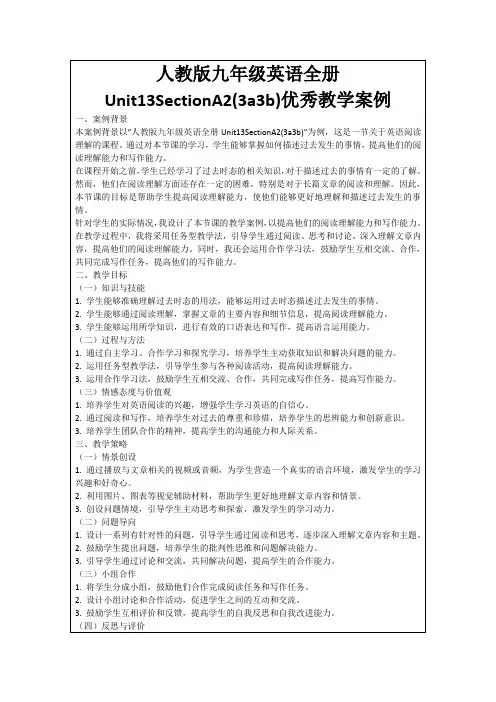
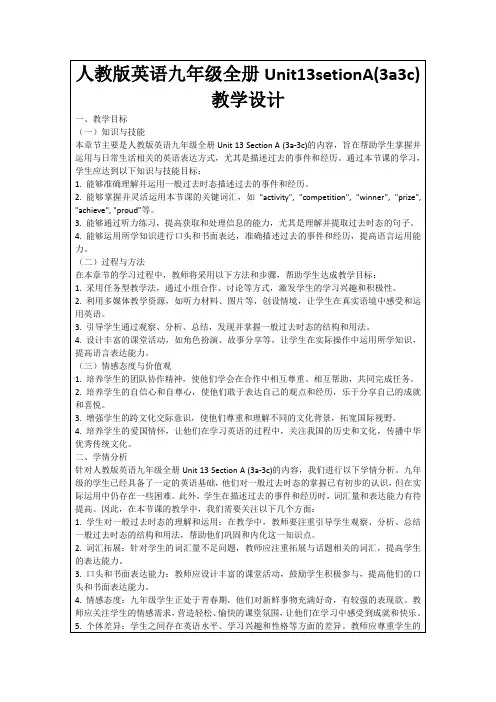
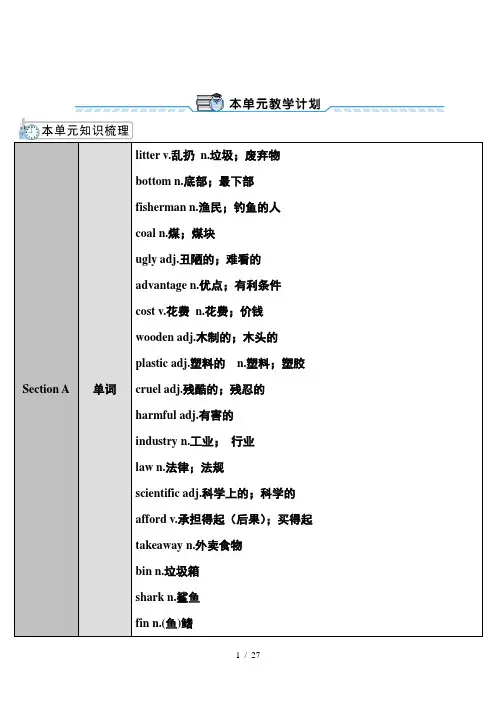
Section A 单词litter v.乱扔n.垃圾;废弃物bottom n.底部;最下部fisherman n.渔民;钓鱼的人coal n.煤;煤块ugly adj.丑陋的;难看的advantage n.优点;有利条件cost v.花费n.花费;价钱wooden adj.木制的;木头的plastic adj.塑料的n.塑料;塑胶cruel adj.残酷的;残忍的harmful adj.有害的industry n.工业;行业law n.法律;法规scientific adj.科学上的;科学的afford v.承担得起(后果);买得起takeaway n.外卖食物bin n.垃圾箱shark n.鲨鱼fin n.(鱼)鳍复习现在进行时、现在完成时和被动语态等的用法。
以“保护环境”为主题,运用本课相关句型与他人展开讨论;能向大家介绍有哪几种污染类型,怎样回收利用废弃物品等。
体会到保护环境的重要性,学会保护大自然、保护地球,从身边的小事做起,号召大家参与到保护环境的行动中来。
【课时建议】本单元建议5课时Section A (1a~2d)……………………………………………………………………………………1课时Section A (3a~4c)……………………………………………………………………………………1课时Section B (1a~1e)……………………………………………………………………………………1课时Section B (2a~2e)……………………………………………………………………………………1课时Section B (3a~3b)……………………………………………………………………………………1课时词汇短语:主要采用多媒体及图片展示法。
基本句子:采用图片展示及交际法(利用多媒体展示两人进行交际时的情景)。
语法:复习现在进行时、现在完成时和被动语态——采用“巧记歌诀”记忆法。
被动语态的用法谁的动作不知道,说出谁做没必要;承受之人需强调,被动语态莫忘了。
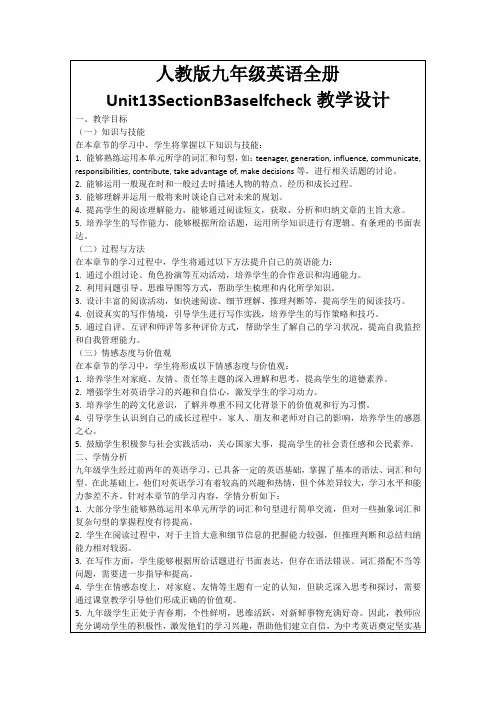
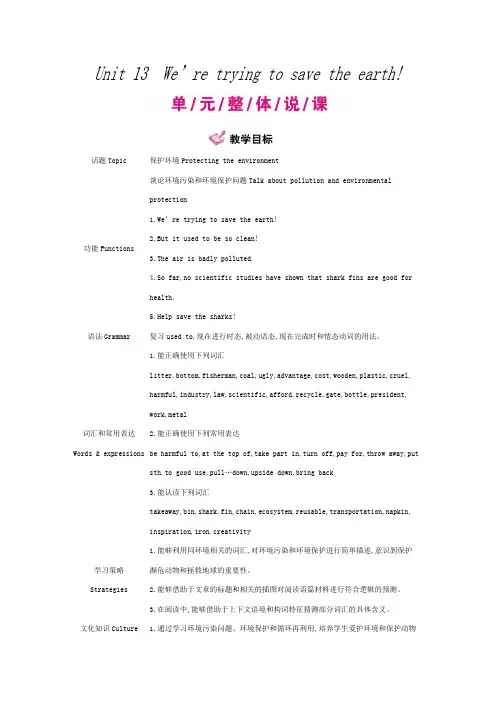
Unit 13 We’re trying to save the earth!话题Topic 保护环境Protecting the environment功能Functions谈论环境污染和环境保护问题Talk about pollution and environmentalprotection1.We’re trying to save the earth!2.But it used to be so clean!3.The air is badly polluted.4.So far,no scientific studies have shown that shark fins are good forhealth.5.Help save the sharks!语法Grammar 复习used to,现在进行时态,被动语态,现在完成时和情态动词的用法。
词汇和常用表达 Words & expressions 1.能正确使用下列词汇litter,bottom,fisherman,coal,ugly,advantage,cost,wooden,plastic,cruel,harmful,industry,law,scientific,afford,recycle,gate,bottle,president,work,metal2.能正确使用下列常用表达be harmful to,at the top of,take part in,turn off,pay for,throw away,putsth.to good use,pull …down,upside down,bring back3.能认读下列词汇takeaway,bin,shark,fin,chain,ecosystem,reusable,transportation,napkin,inspiration,iron,creativity学习策略Strategies 1.能够利用同环境相关的词汇,对环境污染和环境保护进行简单描述,意识到保护濒危动物和拯救地球的重要性。
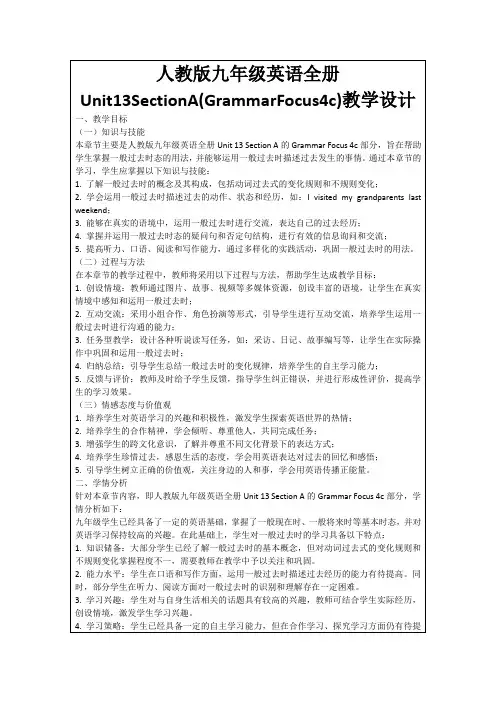
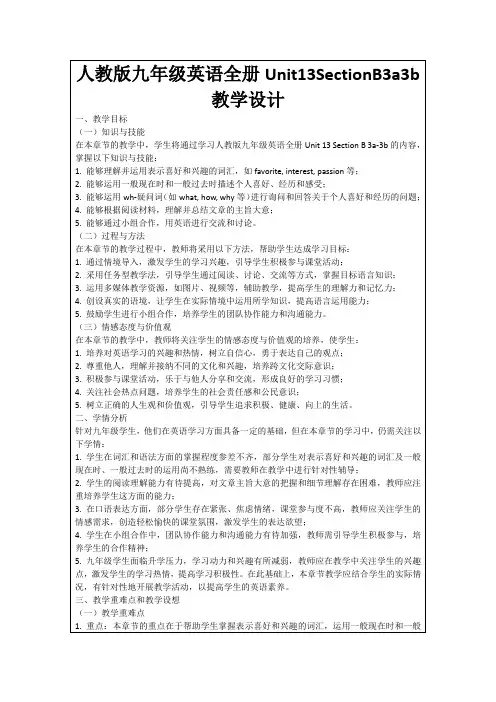
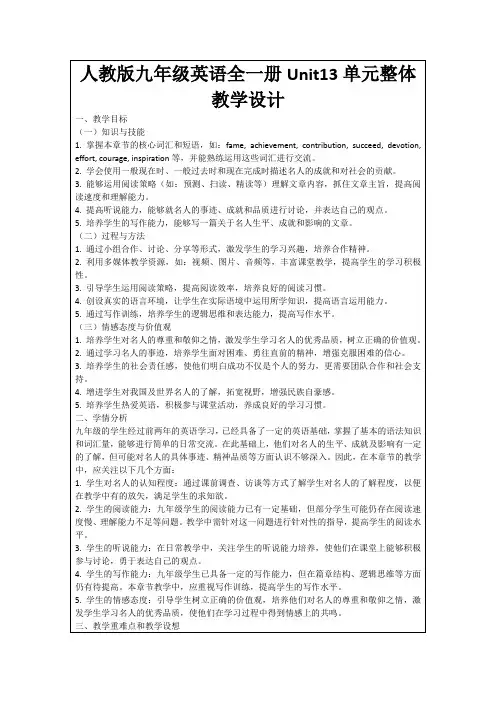
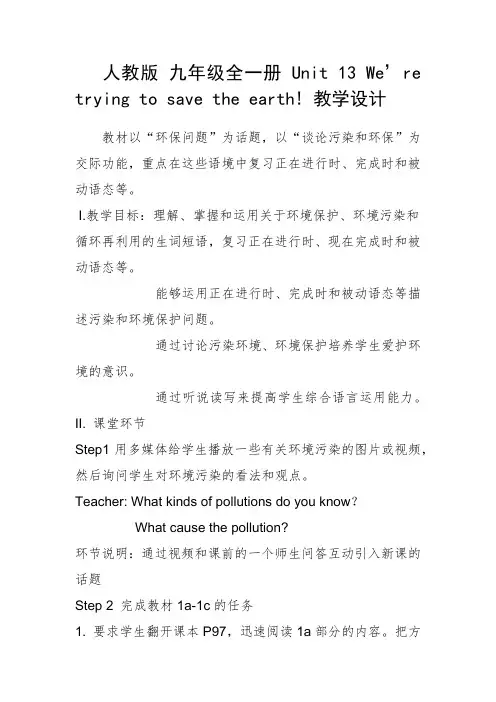
人教版九年级全一册 Unit 13 We’re trying to save the earth! 教学设计教材以“环保问题”为话题,以“谈论污染和环保”为交际功能,重点在这些语境中复习正在进行时、完成时和被动语态等。
I.教学目标:理解、掌握和运用关于环境保护、环境污染和循环再利用的生词短语,复习正在进行时、现在完成时和被动语态等。
能够运用正在进行时、完成时和被动语态等描述污染和环境保护问题。
通过讨论污染环境、环境保护培养学生爱护环境的意识。
通过听说读写来提高学生综合语言运用能力。
II. 课堂环节Step1用多媒体给学生播放一些有关环境污染的图片或视频,然后询问学生对环境污染的看法和观点。
Teacher: What kinds of pollutions do you know?What cause the pollution?环节说明:通过视频和课前的一个师生问答互动引入新课的话题Step 2 完成教材1a-1c的任务1. 要求学生翻开课本P97,迅速阅读1a部分的内容。
把方框中的单词按它们产生污染的类型写入相应的栏目中,并添加更多的单词。
2. 检查答案,先要求全班一起给出答案并检查讨论。
然后要求2-3名同学给出自己的答案,并把收集的答案列举在黑板上。
3. 要求学生听第一遍录音,并根据听到的内容完成课本上1b表格中的句子。
然后要求2-3名同学读答案。
(polluted, rubbish, fish Litter rubbish newspaper, stop, clean)4. 要求学生听第二遍录音,并逐句进行跟读。
5. 完成教材1c的任务,要求学生模仿1a内容,编造自己的关于污染的对话并进行对话练习。
并邀请2-3对同学当堂进行演示。
6. 小结训练。
要求学生在规定的时间内完成一个小练习。
并请若干学生给出自己的答案。
有错误的话及时解决纠正。
用所给词的适当形式填空。
1. There are many kinds of pollutions(pollute)in our daily life.2. All of the students should take part in keeping (keep) our school clean and tidy.3. Can you tell us your ideas for improving (improve) your spoken English.4. W e should stop using the wooden (wood) chopsticks toprotect the forest.5. Their grandparents were fishermen (fisherman) near the sea before they moved to the town.环节说明:通过学习1a,使学生对过去完成时态有所了解,并拓宽了思路;通过1b,锻炼学生的听力及抓取关键信息的能力;通过1c的训练锻炼学生的口头表达能力,同时巩固对本课内容的认识。
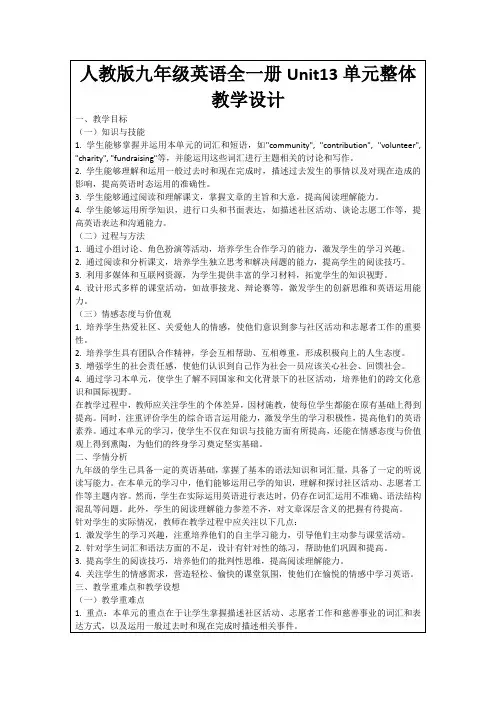
Unit 13 We are trying to save the earth!教学设计这个可怜的人不仅被罚款,而且还被送进了监狱;beharmfulto对…有害;e.g. Smokingisharmfultoth;Playingcomputergamesmuch;电脑游戏玩太多对学生有害;3.Sharksareatthetopofthe;鲨鱼位于海洋生物系统食物链的顶部;at the top of在...最高地位;这个可怜的人不仅被罚款,而且还被送进了监狱。
be harmful to 对… 有害e.g. Smoking is harmful to the health. 吸烟有损健康。
Playing computer games much is harmful to students.电脑游戏玩太多对学生有害。
3. Sharks are at the top of the food chain in the ocean’s ecosys tem.鲨鱼位于海洋生物系统食物链的顶部。
at the top of 在...最高地位; 用最高[最大]的(速度, 声音等)e.g. I looked at the top of his head, his hair shiny and parted s moothly.我看他的头顶, 头发光亮, 分得平滑。
He shouted at the top of his voice in order that he might be hear d.他尽力大声叫喊, 以便别人能听见。
4. If their numbers drop too low, it will bring danger to all oce an life.如果它们的数目降至过低,会给所有海洋生物带来危险。
此句复数形式的number表达全海洋中鲨鱼的总量。
当表示数值的高或低时,number要用high或low修饰。
Unit13 Section A(3a-3b)一 Teaching aimsTarget language:No scientific studies have shown that shark fins are good for health.The number of some kinds of sharks have fallen be over 90 percent in the last 20 to 30 years.Grammar: Present perfectWords and expressions:Curriculum words: shark, cruel, harmful, chain, ecosystem, industry, law, scientific, afford, reusable, transportationUseful expressions: be harmful to, at the top of, the food chain, take part in, turn off, pay二Teaching key pointsTarget Language三Teaching difficult pointsHow to improve students’ integrating skills.四Teaching stepsStep1 Warming upStep2 Learning3a. To give Ss practice in reading for specific information. Learning more about sharksAsk Ss to do some additional research to find out more about sharks before this lesson.3b. To give Ss the opportunity to review the use of conjunctions. Shark fin soup is a Chinese delicacy that is popular not only in China, but also among the Chinese population in other countries like Singapore and Malaysia.Review of conjunctions○so: used to say that something is a result of something else that has just been mentioned.e.g. I was tired, so I decided to take a map.○ although: used to contrast one part of a sentence with another, has the effect of making the main idea in the sentence seem surprising or unexpected.e.g. Although she studied hard, she did not pass the exam.○ if: used to talk about the circumstances in which something else might happen; gives the condition for something else to happen.e.g. If you study hard, you will do well.○but: used to contrast two parts of a sentence and show that they are opposite or very different in meaning.e.g. The children stopped plying when they heard the bell.Step3 PracticeRetell the passage according to the words on the screenLanguage pointsStep4 Blackboard DesignUnit 13 we’re trying to save the earthSection A 3a -4cNo scientific studies have shown that shark fins are good for health.The number of some kinds of sharks have fallen be over 90 percent in the last 20 to 30 years.Step5 Teaching Feelings。
Unit 13 We’re trying to save the earth!Dajin Middle School : Wu Jingxia一、教学目标:1. 语言知识目标基本词汇:litter, advantage, bottom, fisherman, coal, ugly, cost, wooden, plastic, takeaway, bin, shark, fin, method, cruel. Harmful, chain, ecosystem, industry, law,scientific, afford, reusable, transportation, recycle, napkin, upside, gate, bottle,president, inspiration, iron, work, metal, creativity,基本词组:be harmful to, at the top(of sth.), take part in, turn off, take action, throw away, put sth. to good use, pull… down, bring back基本句型:We’re trying to save the earth!The river used to be so clean.The air is badly polluted.No scientific studies have showed that shark fins are good for health.We should help save the sharks.2. 技能目标: 能正确运用现在进行时,现在完成时,被动语态,情态动词和used to 句型。
3. 情感目标:有环境危机意识,学会关注环境保护环境。
二、教学重难点:1. 教学重点:(1)能正确运用现在进行时,现在完成时,被动语态,情态动词和usedto 句型。
(2)保护环境的措施方法。
2. 教学难点:能正确运用现在进行时,现在完成时,被动语态,情态动词和used to 句型。
三、教学步骤:Section A 1 (1a-2d)I. PresentationShow the picture of the earth and tell students the earth is polluted now.For example: (1) The factories that burn coal pollute the air with a lot of black smoke.(2) Factories put waste into the river.(3) People should throw away litter in the bin.(4)There are more cars on the road.II. LearningHere are some words related to different kinds of pollution. Write them in the box below.____________ ___________ _________________________ ___________ _________________________ ___________ _________________________ ___________ _____________Keys : noise pollution loud music planes mobile phones building houses air pollution factories smoking cars building houseswater pollution ships rubbish littering factoriesIII. Listeningclose down clean up2. Listen again and check (√) the sentences you hear.1) We could go fishing in the river.2) The river was really dirty.3) The river has always been the nicest river in this town.4) We should ask the teachers for help.Keys: 2 3IV. Practice1. Role-play the conversation in 1c.Mark: The river was dirty. Even the bottom of the river was full of rubbish. Tony: But it used to be so clean!Mark: Yes, but people are throwing litter into the river.Tony: Everyone in this town should play a part in cleaning it up!2. Make conversations using the pollution in 1a.A: The river has always been the nicest river in this town.B: Yes, it used to be so clean.A: But I was there last weekend and the river was really dirty.B: What caused the problem?A: People are throwing litter into the river.B: What should we do?A: Factories are also putting waste into the river.B: Yes, everyone in this town should play a part.A: We should write to the government and ask them to close down the factories. B: What else can we do?A: Everyone should help to clean up the river.V. Language points1. We’re trying to save the earth!我们正在竭尽全力拯救地球!try to do =try one’s best to do 努力去做某事。
e.g. Every student should try to study hard in order to study in a university.为了进入大学学习,每个学生都应该努力学习。
2. Here are some words related to different kinds of pollution.be related to 与…有关e.g. I am not related to him in any way. 我和他无任何关系。
3. Everyone in this town should play a part in cleaning it up!play a part in 在……方面起作用e.g. A good diet plays a large part in helping people live longer.健康的饮食在帮助人们长寿方面起着非常大的作用。
play a part 在……中扮演角色e.g. He was invited to play a part in this TV play.他被邀请参加这个电视剧的演出。
4. Even the bottom of the river was full of rubbish.Yes, but people are throwing litter into the river.litter 和rubbish 都可指“垃圾”,用作不可数名词。
rubbish 指“没用的东西(被扔或将要丢弃的无用的东西)”不可回收。
litter 指“(室内或公共场所)乱扔的废物(纸屑、不要的包装纸、废瓶等)”还可回收e.g. Throw the rubbish out. 把垃圾扔出去。
The room is full of rubbish. 房间里堆满了垃圾。
Pick up your litter after a picnic. 野餐后将废弃物收拾好。
VI. Listening1. 2a Listen to the interview. Circle the kinds of pollution that Jason and Susan talk about.A. land pollutionB. air pollutionC. noise pollutionD. water pollutionKeys: B A2. 2b Listen again and complete the sentences.1) The air is badly polluted because there are ___________ on the road these days.2) Factories that burn coal also ________ the air with a lot of black smoke.3) There is also too much rubbish and waste. People _________________ things every day.4) People are also littering in ______________ like parks. This is turning beautiful places into ugly (丑陋) ones.Keys: more cars pollute are throwing away public places3. Listen and answer the questions.1) Who is the interviewer talking to?2) What are they talking?3) What other problems do they see?Keys: Susan and Jason.The environmental problems.There’s too much rubbish and waste in the streets.VII. Practice (2c)Use the information in 2a and 2b to role-play conversations between Jason and Susan. Jason: The air has become really polluted around here. I’m getting very worried.Susan: Yes, I used to be able to see stars in the sky.Jason: The problem is that…VIII. DiscussionAsk students what we should do to save the earth. Help students answer, turn off thelights when you leave a room; stop riding in cars; stop using paper towels or napkins;recycle books and paper.IX. ReadingInterviewer: Jason and Susan, what are your ideas for solving these problems?Jason: Well, to cut down air pollution, we should take the bus or subway instead of driving. Susan: Yeah, or ride a bike. There are other advantages (优点) of bike riding. It’s good for health and it doesn’t cost (花费) anything!Interviewer: Great ideas! What about waste pollution?Susan: Mmm, I think simple things like bringing a bag to go shopping can help. I started doing that a year ago.Jason: Me, too. Also, I never take wooden chopsticks or plastic (塑料) forks when I buy takeaway (外卖食品) food. I use the ones at home.Susan: And remember to throw rubbish in the bins and keep public places clean and beautiful for everyone.Interviewer: So together, our actions can make a difference and lead to a better future!X. Summary and language points1. This is turning beautiful places into ugly ones.turn… into… 把……变成……e.g. The icy rain seemed like to turn into snow.渐渐地冻雨又变成雪花的模样。